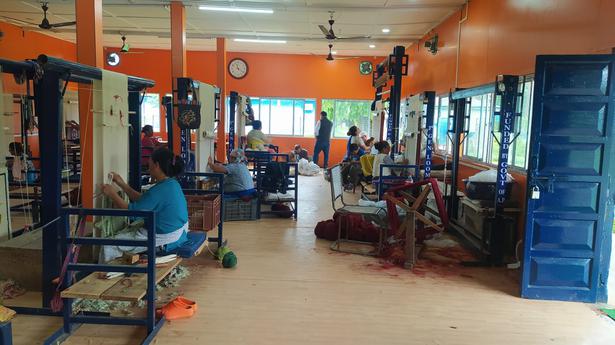
Musical boost for Tibetan carpets in Arunachal Pradesh
The Hindu
The ₹15-lakh overhaul of a weaving centre has worked wonders
An investment in a music system may power the journey of a carpet-weaving centre in Arunachal Pradesh from gloom to a GI (geographical indication) boom.
Floor and wall carpets have been the unique selling point for the Choephelling Cooperative Society since it was established in 1975 by Tibetan refugees on the outskirts of Miao, a subdivisional headquarters in Changlang district.
But productivity slumped after more than four decades and the society was finding it hard to replace the ageing weavers with younger, faster ones. Reasons: the carpet unit and its wooden looms were falling apart and a poor lighting system was affecting the eyesight of the weavers.
The scenario changed after the Changlang district administration undertook a ₹15-lakh project to overhaul the carpet-weaving centre a few months ago.
“The old looms were non-adjustable. For carpets of different sizes, they had to dismantle a loom and reinstall it, wasting a day in the process. The weavers also had to sit on a low wooden block, bend and stand for different stages of work on a carpet,” said Sunny K. Singh, Changlang’s Deputy Commissioner.
“We replaced the old looms with 30 adjustable third-generation metal looms and provided ergonomic seats that are adjustable to four heights, thus eliminating bending and standing. The interiors were redone to make them cooler and airier while soothing ceiling lights were provided for better illumination,” he said.
The game changer was a music system worth ₹68,000. It plays a range of Tibetan and popular songs, often in sync with the movement of the weavers’ hands and fingers.

“Writing, in general, is a very solitary process,” says Yauvanika Chopra, Associate Director at The New India Foundation (NIF), which, earlier this year, announced the 12th edition of its NIF Book Fellowships for research and scholarship about Indian history after Independence. While authors, in general, are built for it, it can still get very lonely, says Chopra, pointing out that the fellowship’s community support is as valuable as the monetary benefits it offers. “There is a solid community of NIF fellows, trustees, language experts, jury members, all of whom are incredibly competent,” she says. “They really help make authors feel supported from manuscript to publication, so you never feel like you’re struggling through isolation.”

Several principals of government and private schools in Delhi on Tuesday said the Directorate of Education (DoE) circular from a day earlier, directing schools to conduct classes in ‘hybrid’ mode, had caused confusion regarding day-to-day operations as they did not know how many students would return to school from Wednesday and how would teachers instruct in two modes — online and in person — at once. The DoE circular on Monday had also stated that the option to “exercise online mode of education, wherever available, shall vest with the students and their guardians”. Several schoolteachers also expressed confusion regarding the DoE order. A government schoolteacher said he was unsure of how to cope with the resumption of physical classes, given that the order directing government offices to ensure that 50% of the employees work from home is still in place. On Monday, the Commission for Air Quality Management in the National Capital Region and Adjoining Areas (CAQM) had, on the orders of the Supreme Court, directed schools in Delhi-NCR to shift classes to the hybrid mode, following which the DoE had issued the circular. The court had urged the Centre’s pollution watchdog to consider restarting physical classes due to many students missing out on the mid-day meals and lacking the necessary means to attend classes online. The CAQM had, on November 20, asked schools in Delhi-NCR to shift to the online mode of teaching.









